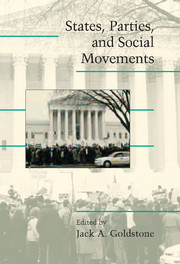Book contents
- Frontmatter
- Contents
- List of Figures and Tables
- Foreword
- Acknowledgments
- Contributors
- INTRODUCTION: BRIDGING INSTITUTIONALIZED AND NONINSTITUTIONALIZED POLITICS
- I States and Social Movements
- II Parties and Social Movements
- 5 PARTIES OUT OF MOVEMENTS: PARTY EMERGENCE IN POSTCOMMUNIST EASTERN EUROPE
- 6 FROM MOVEMENT TO PARTY TO GOVERNMENT: WHY SOCIAL POLICIES IN KERALA AND WEST BENGAL ARE SO DIFFERENT
- 7 PARTIES, MOVEMENTS, AND CONSTITUENCIES IN CATEGORIZING RACE: STATE-LEVEL OUTCOMES OF MULTIRACIAL CATEGORY LEGISLATION
- 8 PROTEST CYCLES AND PARTY POLITICS: THE EFFECTS OF ELITE ALLIES AND ANTAGONISTS ON STUDENT PROTEST IN THE UNITED STATES, 1930–1990
- Afterword: Agendas for Students of Social Movements
- References
- Index
5 - PARTIES OUT OF MOVEMENTS: PARTY EMERGENCE IN POSTCOMMUNIST EASTERN EUROPE
Published online by Cambridge University Press: 26 February 2010
- Frontmatter
- Contents
- List of Figures and Tables
- Foreword
- Acknowledgments
- Contributors
- INTRODUCTION: BRIDGING INSTITUTIONALIZED AND NONINSTITUTIONALIZED POLITICS
- I States and Social Movements
- II Parties and Social Movements
- 5 PARTIES OUT OF MOVEMENTS: PARTY EMERGENCE IN POSTCOMMUNIST EASTERN EUROPE
- 6 FROM MOVEMENT TO PARTY TO GOVERNMENT: WHY SOCIAL POLICIES IN KERALA AND WEST BENGAL ARE SO DIFFERENT
- 7 PARTIES, MOVEMENTS, AND CONSTITUENCIES IN CATEGORIZING RACE: STATE-LEVEL OUTCOMES OF MULTIRACIAL CATEGORY LEGISLATION
- 8 PROTEST CYCLES AND PARTY POLITICS: THE EFFECTS OF ELITE ALLIES AND ANTAGONISTS ON STUDENT PROTEST IN THE UNITED STATES, 1930–1990
- Afterword: Agendas for Students of Social Movements
- References
- Index
Summary
The essays in this volume challenge the distinction between social movements and institutional politics by arguing that movements are deeply entwined with normal politics. This essay extends this argument to the new democracies of Eastern Europe. It analyzes the transformation of the social movements that assumed power in new governments after the fall of communism, and shows how social movements may give rise to institutions of political consultation and accountability between states and their citizens. Yet, in the wake of rapid regime change and the absence of long-standing domestic models for democratic institutions, the antiregime social movements did not smoothly evolve into democratic parties. Rather, both international actors and domestic constituencies influenced divisions and conflicts, and produced different outcomes in each case.
The cases presented in this essay suggest that movements are transformed by governing and, moreover, that the parties that emerge from movements do not necessarily conform to standard notions of political parties. Initially, movements may form parties around political cleavages rather than the socioeconomic interests traditionally emphasized by the scholarly literature. Further, international actors may influence this development by encouraging movements to adopt new organizational forms and issues – areas lacking historical precedent. These forms and issues are not simply imitated, however, but are subsequently adapted to mobilize domestic public support. The results thus do not necessarily conform to Western parliamentary models of parties and politics.
To develop these claims, I compare the transformation of social movements into political parties in two countries, the Czech Republic and Slovakia.
- Type
- Chapter
- Information
- States, Parties, and Social Movements , pp. 147 - 169Publisher: Cambridge University PressPrint publication year: 2003
- 5
- Cited by

